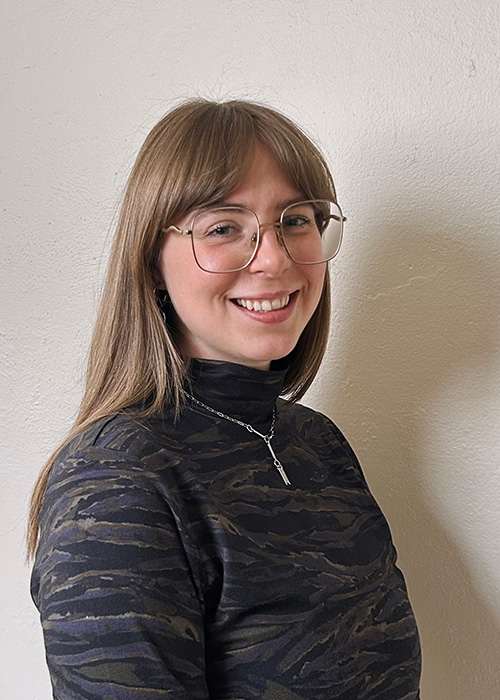Alex Gabbey, a PhD student in Professor Sophie Rousseaux's research group, is the recipient of a highly competitive Women Chemists Committee (WCC) Merck Research Award.
Alex completed her BSc in chemistry at the University of Alberta in 2020. She subsequently joined the department at the University of Toronto to complete her PhD in organic chemistry in the lab of Prof. Sophie Rousseaux. Now entering her fifth year, Alex’s research involves Ni-catalyzed reactions of redox-active esters, as well as the synthesis and functionalization of strained rings. Outside of the lab, Alex enjoys baking, playing the piano, running, and exploring new Toronto cafes and thrift stores with friends.
We caught up with her just after her presentation at the WCC Symposium.

What can you tell me about the research you just presented at ACS in conjunction with the award?
One of the main areas of research in the Rousseaux group is nickel catalysis. My research has focused on developing Ni-catalyzed reactions of N-hydroxyphthalimide (NHP) esters, a class of redox-active substrates. These substrates are easy to synthesize and are bench stable, which makes them very useful cross-coupling partners. Using these substrates, we’ve been able to synthesize a variety of pharmaceutically relevant molecules that would otherwise be challenging to access. From a larger picture, the methods we’ve developed are new synthetic “tools” that the chemistry community can use to form important carbon–carbon bonds. Much of this work has been completed in collaboration with industrial partners such as Merck and Genentech, which has been an amazing opportunity.
You received a number of Chemistry Department awards this past May, including the Adrian Brook Graduate Scholarship in Organic Chemistry and the Merck Canada Ltd. Chemistry Conference Award. Now with this latest honour, it seems like your career here at U of T has been really successful already. What factors have helped you on this journey?
It’s been an honor to receive each of these awards! I think one of the key factors has been persistently applying, even if it takes a few tries. It’s easy to talk myself out of applying for awards due to their competitive nature but I wouldn’t be a recipient if I hadn’t applied.
These awards are a testament to what a fantastic research group I’m part of. No one conducts research in a vacuum and I’ve been fortunate to have amazing labmates to bounce ideas off of and troubleshoot problems with.
I’ve also had a phenomenal supervisor in Sophie. She has been incredibly supportive of me from day one, whether it’s applying for scholarships, trying new ideas, applying for conferences, you name it. I couldn’t be more grateful for the research environment and support in the Rousseaux group.
Have there been any challenges or surprises along the way that you might like to share?
Moving across the country to begin grad school was very challenging, especially during the pandemic. However, since then I’ve been pleasantly surprised by just how many unique opportunities grad school can hold. Research takes up the majority of my time but I’ve also had opportunities to get involved in student groups, plan and attend conferences, plan an international exchange, and more! I didn’t realize at first how much a PhD really becomes what you make of it. I’ve been trying to make the most of it and to learn as much as I can, both inside and outside of the lab.
Speaking of student groups, you have served on the board of WICTO. Now you’ve won a highly competitive award from the Women Chemists’ Committee. What advice would you give other scientists who might be considering applying for the WCC Merck Research Award this fall?
I served two years on the WICTO executive team from 2022–2024. This experience was truly a degree highlight; it allowed me to connect with a community of chemists outside of my discipline who are all passionate about equity, diversity, and inclusion! I’m not sure how this experience may have impacted my application to the WCC Merck Research Award but I would encourage other applicants to highlight their unique interests and journeys beyond the science they conduct. I think committees often enjoy learning about the person behind the chemistry, in addition to the chemistry itself.
What was it like presenting at ACS?
I had a great experience presenting at ACS! I gave a talk during the WCC Symposium alongside the seven other award winners. All the award winners were from different disciplines, so it was awesome to hear about research that was totally different from my own. Afterwards, we had a luncheon together and were able to meet members of the WCC and our mentors from Merck. We were also invited to attend several other events hosted by the WCC later in the week. It was wonderful to meet so many incredible women in person and to make new connections throughout the conference!
ACS is a huge meeting. I was able to attend a multitude of excellent talks and poster sessions throughout the week. Some highlights for me were the industrial talks, as well as the Arthur C. Cope Award Symposia. I also saw many fantastic student talks on total synthesis and organic methods. The Division of Organic Chemistry ice-cream social was also a highlight!
It’s easy to talk myself out of applying for awards due to their competitive nature but I wouldn’t be a recipient if I hadn’t applied.
--Alex Gabbey


